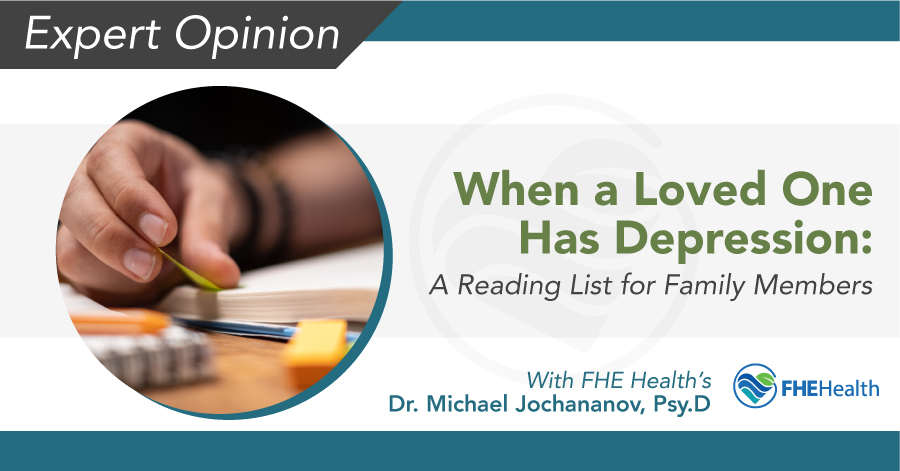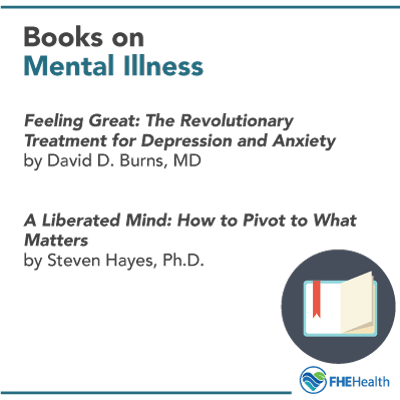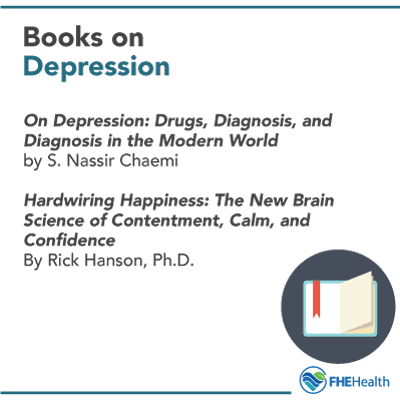
This article has been reviewed for accuracy by our peer review team which includes clinicians and medical professionals. Learn more about our peer review process.
When a loved one has a mood disorder like major depression, it can be hard to know how to love and support them. The condition—and its causes, symptoms, and effects—can be hard to understand. Sometimes mental health and life challenges can be difficult to navigate. Sometimes they can be overwhelming.
As a licensed clinical psychologist and the director of FHE Health’s Restore Mental Health Program, Dr. Michael Jochananov, Psy.D., has been working with patients with severe depression for more than 20 years. Dr. Jochananov’s clinical team also regularly speaks with family members who have questions and concerns about how best to support their loved one in treatment and beyond.
Often, with a little more education on depression, family members feel more supported, less stressed, and better equipped to help their loved ones; so, we asked Dr. Jochananov what books he’d recommend for families and why. Below is his recommended reading list for families who may be looking for more advice and information about depression.
Books for Family Members of Someone with Mental Illness
 If you google “books for family members of someone with mental illness or depression,” it will quickly become evident that there is no dearth of reading material out there. Much of it may be helpful. The challenge can be knowing where to start. If you’re looking for practical, how-to tips and tools that can help you navigate depression, Dr. Jochananov was able to recommend these books.
If you google “books for family members of someone with mental illness or depression,” it will quickly become evident that there is no dearth of reading material out there. Much of it may be helpful. The challenge can be knowing where to start. If you’re looking for practical, how-to tips and tools that can help you navigate depression, Dr. Jochananov was able to recommend these books.
Feeling Great: The Revolutionary Treatment for Depression and Anxiety, by David D. Burns, MD, is an updated version of Dr. Burns’ bestselling book Feeling Good. Why is it worth a read?
“It addresses how people struggling with symptoms of depression are often depressed because they see the world through an inaccurate, overly pessimistic lens,” Dr. Jochananov said. “This book focuses on how to help the depressed individual challenge those faulty thoughts and replace them with ones that align more closely with a healthy and productive life.”
In other words, our moods and emotions are often a product of what we are thinking. This simple premise is at the core of a school of psychotherapy known as Cognitive-Behavioral Therapy (CBT), which inspires much of the content in Feeling Great. Its case studies and CBT-informed tools aim to show that it is possible to feel better by correcting distorted thought patterns.
A Liberated Mind: How to Pivot to What Matters, by Steven Hayes, Ph.D., builds on principles from CBT and traditional behavior therapy to lay out its own unique approach to depression. “Acceptance and Commitment Therapy,” as the author Dr. Hayes calls it, advocates relating differently to negative thoughts and emotions—more in terms of acceptance and mindfulness.
“ACT suggests that you non-judgmentally accept negative thoughts and commit to relating to them differently through psychological flexibility,” Dr. Jochananov explained.
The idea is that acceptance of difficult emotions like depression and anxiety makes it easier to move forward with life. Typically, the mind defaults to “problem-solving” and ridding itself of uncomfortable emotions, but this can cause people to get stuck in their painful emotions and depression. Accepting the hard emotions, on the other hand, is an exercise in vulnerability. It is also a route to psychological flexibility and the liberation that Dr. Hayes describes.
Books on Understanding Depression
In addition to the how-to books, there are books on understanding depression. These titles are for those looking for more of a descriptive and informative introduction to the science of depression and its causes, diagnosis, treatment, and other related issues. Here, too, Dr. Jochananov was able to recommend a potential starting place.
On Depression: Drugs, Diagnosis, and Diagnosis in the Modern World, by S. Nassir Chaemi, is “not a how-to guide, but provides a global perspective on depression, incorporating biology, psychology, and philosophical foundations,” Dr. Jochananov said. New York Times bestselling author (S. Nassir Chaemi) is the director of the Mood Disorder Program at Tufts Medical Center and has written profusely on the topic, having authored numerous books on related topics.
There is much utility in this panoramic view of depression. It helps to contextualize depression, not just as a medical and psychiatric diagnosis but as a reflection of modernity’s unrealistic and relentless pursuit of feel-good happiness.
Books That Explain Why Depression Is Hard to Understand
 Depression can be perplexing for anyone. Even for those who have had it, understanding how to love and support a loved one with the condition can be difficult, for more than one reason. Mental health stigmas can further complicate this challenge. Books that explain why depression is hard to understand may provide some much-needed enlightenment.
Depression can be perplexing for anyone. Even for those who have had it, understanding how to love and support a loved one with the condition can be difficult, for more than one reason. Mental health stigmas can further complicate this challenge. Books that explain why depression is hard to understand may provide some much-needed enlightenment.
Hardwiring Happiness: The New Brain Science of Contentment, Calm, and Confidence, by Rick Hanson, Ph.D., “guides readers to understand that many of our mood disorders are caused by disordered thinking,” Dr. Jochananov said. He briefly summarized the book’s definition of depression as follows: “All humans have a tendency to focus on the negative—depressed humans hyper-focus on the negative.”
Couched in this way—as the over-activation of a universal human tendency to be negative—depression may be easier to understand or empathize with. In fact, the book explains this human tendency to give more weight to negative thoughts in terms of our evolutionary survival. Our earliest ancestors needed to learn much more quickly in dangerous circumstances than in happy ones. That is why even today the memories and emotions that we attach to negative past experiences are more vivid and intense than the memories and emotions that we associate with positive experiences.
Hardwiring Happiness doesn’t stop here, thankfully. It makes the encouraging claim that we can change our brains for the better by, in essence, training our minds to be more present in those aspects of daily life that give us joy and contentment. Meditation is a tool by which we (whether the individual with depression or the concerned family member) can develop a healthier, happier brain. Dr. Jochananov said the author uses a four-step “meditative practice to ‘hardwire’ the brain to be more resilient to negative thoughts.”
“No man is an island,” the English poet John Donne once wrote, reflecting on the interconnectedness of human beings (although women and men do face different stigmas about depression). Something similar might be said of those with depression. Rarely does the condition only affect the person diagnosed. More often, close family members and loved ones are also impacted, sometimes in profound ways. Hopefully, this short reading list can be a source of help, hope, and understanding— and a reminder that there are many resources out there.






